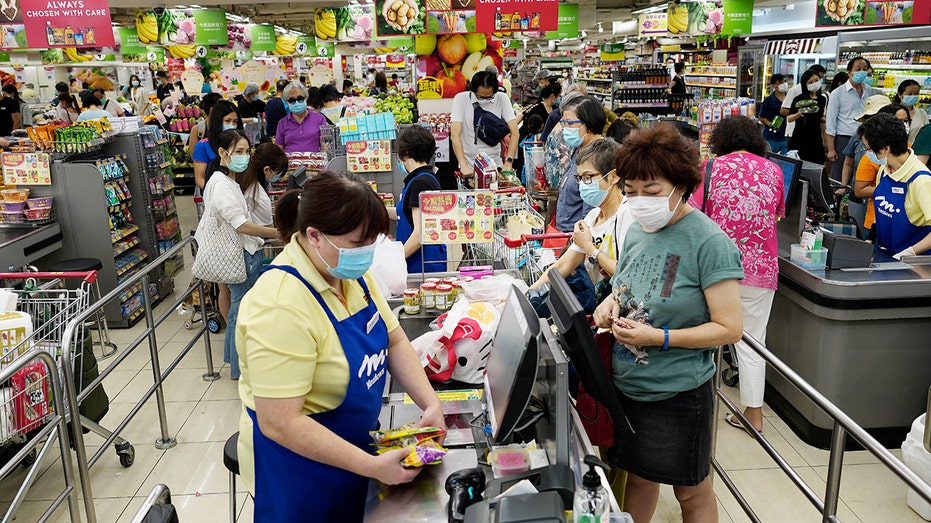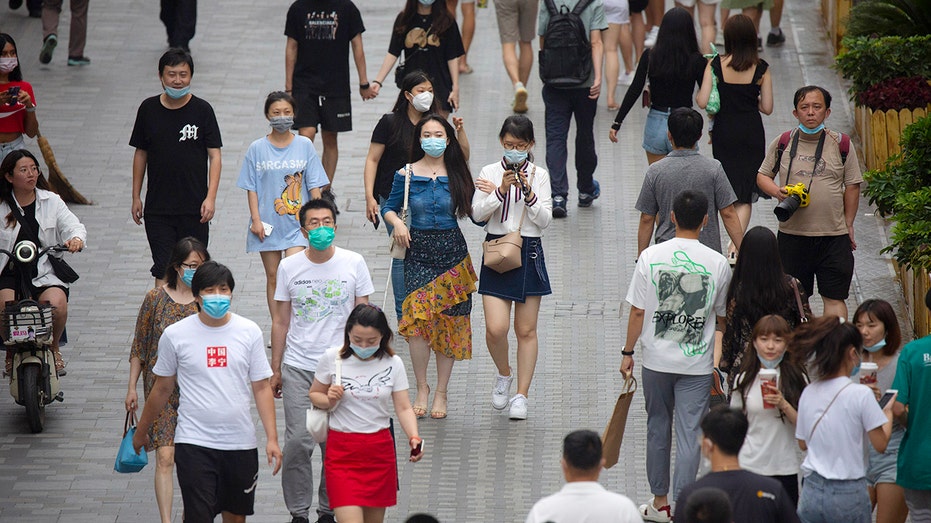Coronavirus is back with a vengeance in places where it had all but vanished
Hong Kong, Japan and Australia are seeing new waves of infections after relaxing COVID-19 restrictions
Australia reported only a handful of new coronavirus cases in early June, while Hong Kong went three weeks without a single locally transmitted infection that month. Japan had already lifted a state of emergency in May after the number of new cases dropped to a few dozen nationwide.
All three reported new high-water marks in daily infection numbers in the past week, showing how difficult it can be to keep the virus at bay, even in places lauded for taking early and decisive action.
The number of infections in all three places are still small in comparison to the world's hardest hit countries, but the fresh waves demonstrate the tricky balancing act authorities face as they attempt to reopen their economies.
GLOBAL CORONAVIRUS CASES EXCEED 15 MILLION
One misstep can quickly undo the gains from weeks of closures, and public-health experts say some complacency and fatigue with social-distancing restrictions is inevitable in a long pandemic.
In Australia, the southeastern state of Victoria recorded 484 new cases on Jul. 22, eclipsing a nationwide high set in March. By Monday, the state's daily infections had climbed to 532--with most in the capital, Melbourne.
"We reported only two cases on June 9, less than six weeks ago, and this shows how quickly outbreaks can occur and spread," Australia's deputy chief medical officer Michael Kidd said.

People wearing face masks shop at a supermarket in Hong Kong Monday, July 27, 2020. (AP Photo/Vincent Yu)
Victoria has accumulated some 7,000 new cases since June 9.
CORONAVIRUS CAUSES HONG KONG DISNEYLAND TO SHUT DOWN AGAIN
The state's chief health officer, Brett Sutton, said this month it is conceivable that most, if not all, cases there could have stemmed from staff members failing to adhere to infection-control procedures at hotels housing travelers returning from overseas. Infection clusters have since spawned in schools, public-housing towers and aged-care homes.
"Clearly there has been a failure in the operation of this program," Victoria's state premier Daniel Andrews said on June 30. Authorities haven't said what the nature of the protocol breaches were, but they are now the subject of a judicial inquiry.
Melbourne, Australia's second most-populous city, is almost halfway through a six-week lockdown. Wearing a mask or face-covering is mandatory when venturing outdoors for essential tasks--but daily cases are still in the hundreds and rising.
"We were so close to having eliminated it from the whole of Australia," said Adrian Esterman, professor of biostatistics at the University of South Australia. "We were a fingernail from doing it, and this happens." He said that if new daily cases remained at current levels, it would soon become unsustainable for stretched contact-tracing teams to track infections.
CORONAVIRUS SENDS HONG KONG ECONOMY TO STEEPEST PLUNGE ON RECORD
Japan has seen a similar resurgence. The seven-day average for daily new cases in Tokyo more than quadrupled this month to 258 as of Sunday. Across Japan, there were a record 981 cases recorded Thursday. The government has again moved to secure hotel rooms to quarantine the infected after releasing most of the rooms it had previously requisitioned.

People wearing face masks to protect against the coronavirus walk through an outdoor shopping area in Beijing, Saturday, July 25, 2020. (AP Photo/Mark Schiefelbein)
Officials said many of the new cases were young people linked to nighttime entertainment districts and that more parties and gatherings in general have contributed to the spread.
Last week, Japan's government pressed ahead with a $10 billion cash-back campaign to promote domestic tourism--rolling it out earlier than planned but now excluding trips to and from hard-hit Tokyo.
Asked about the second wave, a spokesman for Prime Minister Shinzo Abe referred to a statement Wednesday in which he defended the government's balancing of economic reopening and virus prevention.
Mr. Abe said "the situation is significantly different from what we saw under the state of emergency in April" because most of the new cases involve young people and hospitals aren't overwhelmed. He said the government would "maintain sufficient vigilance against the spread of infections" while gradually reopening the economy.
RECORD NUMBERS OF CORONAVIRUS CASES IN EVERY GLOBAL REGION: REUTERS TALLY
Facing the prospect of a protracted recession after a year of antigovernment protests followed by the pandemic, Hong Kong's government gave every adult permanent resident $1,290 to encourage people to spend and revive the recession-hit economy.
On June 16, city authorities lifted restrictions on indoor gatherings, restaurants and gyms. New local infections ceased--until July 5.
Since then, Hong Kong has racked up more than 1,300 new cases, 87% of them locally transmitted. Within days of the cash handouts reaching residents, renewed social distancing saw fresh closures or restrictions on gyms, bars and restaurants.
Local epidemiology experts say they believe missteps by the government, such as exemptions for some foreign arrivals--including pilots, airline and cargo-ship crew--from testing or the 14-day mandatory quarantine, were factors in the latest wave of coronavirus. The city contained an initial outbreak brought by visitors from Wuhan, China, in late January, and then a second wave in March as travelers and students returned from overseas.
Hong Kong has tightened regulations following the latest outbreak--starting July 29, travelers from the U.S. will be added to a list of high-risk countries, requiring them to provide a negative test before flying and proof they have booked a hotel for their quarantine before boarding their flights.
"The problem is we have a lot of exempted persons," said Dr. Leung Chi-chiu, the chairman of the Hong Kong Medical Association's advisory committee on communicable diseases. Between April and mid-July, at least 161,000 arrivals in Hong Kong were exempted from testing and having to quarantine, according to official figures.
CORONAVIRUS TESTING STEPPED UP AS NUMBER OF NEW CASES SURGES
The city's health officials identified a number of recent clusters related to at least nine taxi drivers and their family members, and people who had visited the same restaurants. Six crew members from six different cargo ships in Hong Kong waters were confirmed carrying the virus, while airline workers have also tested positive since they were subjected to mandatory testing from July 8.
On Sunday, Hong Kong said it would start barring passenger and cargo ships from replacing crews, except for those unloading freight in the city.
Lockdown fatigue also played a part, said infectious-diseases expert Dr. Joseph Tsang Kay-yan, as the city's residents have been living under social-distancing restrictions for more than six months.
GET FOX BUSINESS ON THE GO BY CLICKING HERE
Most of Australia has enjoyed prolonged spells without locally-transmitted infections. The relative speed at which the initial outbreak was contained and the low mortality rate, public health experts say, may have contributed to a sense of complacency by the time the second wave hit, despite constant government warnings.
Mr. Andrews, the Victorian Premier, said last week that a sample from this month's outbreak showed nearly 90% of people didn't self-isolate between showing symptoms and getting a test. Even after taking a test, he said, more than half didn't self-isolate while awaiting their results.
"Pretending that it is [over] because we all want it to be over is not the answer," he said. "It is indeed part of the problem."
Miho Inada in Tokyo contributed to this article.




















